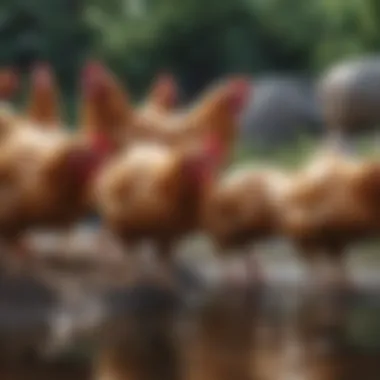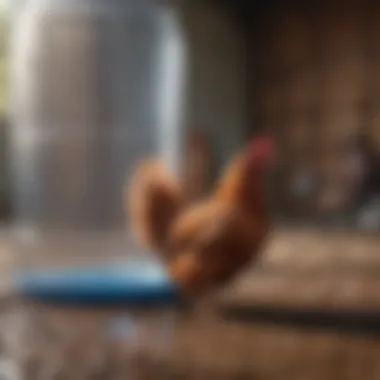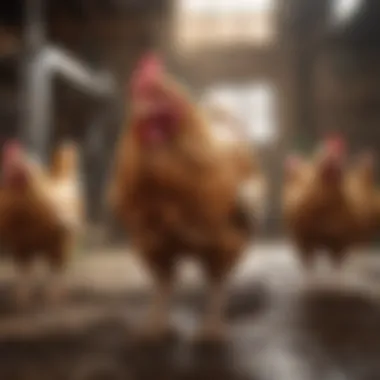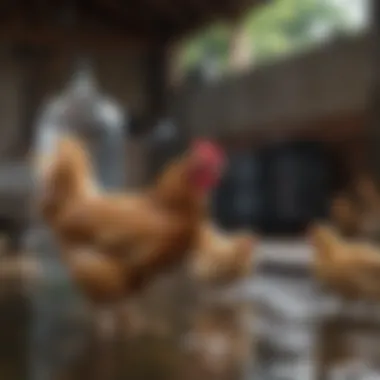Understanding Chicken Drinking Behaviors: A Guide for Owners


Intro
Understanding the drinking behaviors of chickens is vital for anyone who keeps these birds as pets or livestock. Hydration is a fundamental need that directly impacts the health and wellbeing of chickens. In this article, we will explore key aspects related to chicken drinking behaviors, discussing the physiological requirements, the effects of environment, and best practices for ensuring adequate hydration for your flock.
Chickens exhibit unique drinking habits influenced by various factors. For example, weather conditions, age, and stage of life can all play significant roles. By comprehending these behaviors, poultry owners can create an environment that supports the needs of their chickens effectively.
This guide aims to provide pet owners with insightful knowledge, addressing common concerns related to water access and hydration practices. We will also highlight the importance of clean water and how to recognize signs of dehydration or related health issues. Enduring hydration practices not only ensure the health of the chickens but also enhance their productivity and general quality of life.
With this foundation, let's delve into the specific aspects of chicken drinking behaviors.
Drinking Needs of Chickens
Hydration is central to the overall physical condition of chickens. A general rule of thumb is that a mature chicken needs about one pint of water daily, though this can vary.
The following factors influence drinking behaviors:
- Temperature: In warmer climates, chickens will drink more water to remain cool and maintain healthy organ function.
- Diet: Chickens consuming dry feed require more water than those eating wet or moist foods.
- Activity Level: More active chickens will have increased hydration needs.
Understanding these needs is crucial for pet owners to maintain the health of their flock.
Water Sources
Providing clean and accessible water sources is important. There are various methods for offering water to chickens:
- Nipple Drinkers: These devices are easy to install and reduce water waste. Chickens learn quickly to peck to receive water.
- Open Water Bowls: These are traditional but require regular cleaning to prevent contamination.
- Automatic Waterers: These can be very convenient for larger flocks, as they refill automatically.
Each method has its pros and cons, and the choice depends on the size of the flock and the specific needs of the chickens.
Signs of Dehydration
Recognizing dehydration in chickens is essential. Some common signs include:
- Lethargy: Chickens may appear sluggish and less active.
- Dryness: Look for dry beaks or loose skin.
- Decreased Egg Production: In laying hens, a decrease in egg production can indicate insufficient hydration.
If these signs are observed, immediate actions should be taken to provide adequate hydration.
The End
Chickens have unique drinking behaviors that require the attention of pet owners. By understanding their hydration needs and providing the right water sources, owners can ensure a healthier environment. Recognizing signs of dehydration and taking proactive measures is crucial for maintaining optimal health in your flock. Such knowledge not only reflects responsible pet ownership but also enhances the overall quality of life for the chickens.
Prelims to Chicken Drinking Habits
The hydration habits of chickens are essential to comprehend for every poultry owner. Chickens, like all animals, require a consistent and clean water supply to thrive. Without adequate hydration, they can face serious health challenges that might impact their overall well-being.
Understanding chicken drinking behaviors begins with recognizing the significant role of water in their daily lives. Chickens not only rely on water for hydration but also for their metabolic processes. This article will explore various aspects of chicken drinking habits, from their basic water needs to common misconceptions that might hinder proper care.
The Importance of Hydration in Chickens
Hydration is crucial for chickens, as they are prone to various health issues if they do not receive enough water. Water supports digestion, helps regulate body temperature, and contributes to vital physiological functions. Proper hydration helps prevent potential problems such as egg-laying issues and reduced immunity to diseases.
It's fascinating to note that chickens can consume different amounts of water based on several factors. The general rule is that a laying hen needs approximately a quart of water daily. However, this need can increase under heat stress conditions or when they are consuming dry feed. Providing access to abundant clean water ensures chickens remain healthy, productive, and content.
Key Points of Hydration Importance:
- Digestion aid: Water helps break down feed, aiding nutrient absorption.
- Temperature regulation: It assists in maintaining the chicken’s body temperature.
- Health maintenance: Proper hydration supports the immune system, reducing disease risk.
Common Misconceptions about Chicken Drinking


Misunderstandings surrounding chicken drinking habits can lead to unsatisfactory care. One common misconception is that chickens can drink any type of water. In reality, their health can be compromised by dirty or contaminated water. Providing fresh, clean water is paramount. Another belief holds that chickens do not drink much water compared to other livestock. In truth, chickens drink regularly, and their consumption varies significantly with temperature and activity levels.
It is also often thought that chickens only drink when they are thirsty. However, stress and overheating can inhibit their drinking behavior. Therefore, it's vital to monitor water sources continuously, ensuring that they are always appealing and reachable.
“An accurate understanding of chickens’ drinking habits can make a substantial difference in their health and productivity.”
Overall, raising awareness about these issues can enhance the quality of care that poultry owners provide.
Physiological Aspects of Chicken Drinking
Understanding the physiological aspects of chicken drinking is crucial for anyone who owns or cares for these birds. Chickens have specific water needs based on their breed, age, and environmental factors. Recognizing these needs helps pet owners ensure that their chickens remain healthy and productive.
Water Requirements Based on Breed and Age
Chickens have varying water requirements that depend greatly on their breed and age. For instance, young chicks need different amounts of water compared to adult birds. Generally, chicks require about 0.5 to 1 liter of water daily, while adult hens often need 1 to 2 liters.
For specific breeds, larger or more active chickens, like Jersey Giants, may have higher water demands compared to smaller breeds such as Bantams. It's essential to monitor their intake and adjust according to their dietary habits and activity levels.
The water requirements may also change during specific times of the year, with increased needs during the hot summer months. Owners should always ensure fresh and clean water is available to meet these needs effectively.
The Role of Water in Digestion
Water plays a vital role in digestion for chickens. It helps in breaking down food, making nutrients more accessible for absorption. Chickens do not possess teeth; instead, they rely on grit in their gizzards to grind food. The presence of water aids in this process and facilitates the overall digestion.
Moreover, effective digestion contributes to nutrient absorption, which is pivotal for growth and egg production. Without adequate water, chickens might experience digestive issues, leading to decreased health and productivity.
Effects of Temperature on Water Intake
Temperature has a significant influence on the water intake of chickens. In hotter climates, chickens tend to consume more water to regulate their body temperature. A high temperature can lead to increased respiration rates and greater water loss through sweat and panting.
In cold weather, however, chickens may drink less frequently. Their water intake might decrease due to the cold, making it essential for owners to ensure that chickens have access to water that is not frozen. Providing heated water sources during winter can help maintain their hydration levels.
Summary: Knowing the physiological aspects of chicken drinking is essential. This knowledge guides pet owners in making informed decisions regarding hydration, ensuring the overall well-being of their chickens.
Environmental Factors Influencing Drinking Behaviors
Environmental factors play a significant role in how chickens access and consume water. Understanding these influences is crucial for poultry owners. Proper hydration is essential for chickens, impacting their health, productivity, and overall well-being. The environmental conditions surrounding the chickens can either facilitate or hinder their drinking habits.
Climate variations, housing conditions, and social dynamics within flocks are key elements. Recognizing these aspects can lead to better management practices and improve chicken welfare.
Impact of Climate on Water Consumption
Climate has a direct correlation with water intake in chickens. In hotter weather, chickens require more water to regulate their body temperature and maintain hydration levels. This need increases significantly due to the evaporation of moisture from their bodies. Therefore, monitoring and ensuring a constant supply of fresh water becomes vital during hotter months. Conversely, in colder conditions, water consumption may decrease. Chickens may drink less due to reduced activity and a lower metabolic rate. Owners should ensure that water does not freeze, as this can lead to dehydration, especially in winter.
Factors to consider include:
- Temperature fluctuations: Monitor daily temperatures.
- Humidity levels: High humidity may reduce moisture evaporative loss but can also affect water intake.
- Wind: Increased wind can enhance evaporation, leading to higher required water levels.
How Housing Conditions Affect Drinking Habits
Housing conditions significantly influence drinking habits in chickens. Adequate space, comfort, and accessibility of water all play essential roles. Overcrowded housing can lead to increased stress, resulting in reduced water consumption. Chickens need their drink sources to be easily reachable and within their living space. If they have to compete for water, some may not drink enough, leading to health problems.
Additionally, the type of materials used in water dispensers can impact hygiene. Unsanitary conditions can deter chickens from drinking, increasing their risk of disease. Owners should choose proper waterers that are easy to clean. Maintaining a clean and organized space with sufficient room around water sources helps promote good drinking behavior.
Social Dynamics within Flocks and Drinking Patterns
Social dynamics affect how chickens interact with their water sources. Chickens are social animals, and their behavior can often be influenced by the presence and actions of others in their flock. Dominant individuals may monopolize access to water, leaving others with limited opportunities. This can particularly be problematic in large flocks where space and resources are limited.


Hierarchy in flocks can dictate drinking patterns. Observing flock behaviors can reveal which birds drink frequently and which do not. Some strategies to mitigate social competition for water include:
- Providing multiple water sources: This reduces competition.
- Encouraging spacing during drinking time: Allowing chickens to drink without pressure.
- Observing flock dynamics: Identifying any issues can help address them quickly.
Best Practices for Providing Water to Chickens
Ensuring proper hydration for chickens is a fundamental aspect of poultry care. The provision of clean and accessible water directly affects the health and productivity of your flock. Understanding best practices for water provision can lead to less stress for the birds and improved overall wellbeing.
Choosing the Right Watering System
Selecting an adequate watering system is vital. There are various types available, and each has its benefits. Common options include:
- Nipple waterers: These reduce spills and keep water clean, as birds drink directly from them.
- Pan waterers: Allow chickens to drink freely. They may need more frequent cleaning.
- Buckets or troughs: Simple to use but can become dirty quickly, requiring regular maintenance.
When choosing a system, consider the flock's size, the specific breed of chickens, and the layout of their living space. Nipple systems might be more suitable for larger flocks, while smaller groups may thrive with pan waterers.
Maintaining Clean Water Sources
Clean water is essential for chicken health. Maintaining this cleanliness minimizes the risk of disease and promotes better drinking habits. Here are essential points to consider:
- Regular Cleaning: Waterers should be cleaned at least once a week. Use warm soapy water to remove algae or debris.
- Location Matters: Place waterers in shaded areas to slow down algae growth and keep the water cooler.
- Monitor Quality: Regularly check for signs of contamination or dirt; remove any debris immediately.
Adhering to these practices not only keeps the water fresh but also makes the chickens more likely to drink consistently.
Monitoring Water Accessibility
Ensuring chickens have constant access to water is critical for hydration. A few practical steps to ensure this include:
- Multiple Sources: In larger enclosures, multiple water sources can prevent competition and ensure all birds have access.
- Consistent Check-ins: Regularly check the water level, especially during hot weather when demand increases.
- Adjust for Clutch: During breeding or chick-rearing seasons, chickens may require more water. Adjust your provisioning accordingly.
Keeping an eye on these elements will help instill hydration habits and promote overall flock health.
Remember: A well-hydrated chicken is a happy chicken. Prioritize their water needs for optimal well-being.
Identifying Signs of Hydration Issues
Recognizing signs of hydration issues in chickens is crucial for their overall well-being. Hydration plays a vital role in various physiological processes within a bird's body. Maintaining a healthy hydration level ensures that chickens can remain active, lay eggs regularly, and resist diseases. Recognizing the early signs of dehydration can help poultry owners take appropriate actions to mitigate risks and ensure their birds stay healthy.
Recognizing Dehydration Symptoms
Chickens can show various symptoms that indicate they may be dehydrated. Here are some key signs to look for:
- Sunken eyes: If your chicken's eyes appear sunken or dull, this is a potential indication of dehydration.
- Dry comb and wattles: A chicken's comb and wattles should be moist and vibrant. If they are dry and shriveled, it suggests that the chicken may lack sufficient water.
- Lethargy: A dehydrated chicken may exhibit a lack of energy, sitting alone and avoiding social interactions.
- Reduced appetite: If a chicken is not eating as usual, it may be related to inadequate water intake.
- Dark or concentrated urine: Notice whether your chickens' droppings appear darker than normal. This could signal dehydration as their body retains more water.
Being attentive to these symptoms allows poultry owners to act quickly. Regularly checking each chicken can lead to early detection and ensure proper interventions.
Responses to Excessive Water Consumption
Excessive water consumption in chickens might seem counterintuitive; however, it can highlight underlying health issues. Here’s how to approach this situation:
- Monitor behavior: If a chicken is drinking significantly more than its peers, it might be an indication of a medical issue. Conditions such as kidney problems or diabetes can lead to increased thirst.
- Consult a veterinarian: If you notice one or several chickens exhibiting this behavior, it’s advisable to seek professional help. A vet can diagnose the specific issue and recommend appropriate treatments.
- Adjust water sources: Ensure that the water containers are sanitary and accessible. Poor quality or contaminated water can prompt increased drinking, suggesting a need for evaluation.
In summary, recognizing signs of hydration issues is essential in fostering a healthy poultry environment. By being vigilant and understanding both dehydration and excessive water consumption symptoms, poultry owners can safeguard the health of their chickens effectively.
Troubleshooting Drinking Problems in Chickens
Troubleshooting drinking problems in chickens is vital for any poultry owner committed to fostering the health and well-being of their flock. Water, being a critical component of a chicken's diet and overall health, cannot be taken lightly. When chickens face drinking challenges, it can lead to serious consequences, including poor growth, reduced egg production, or even mortality. Identifying such issues early is essential. This section provides insights into common problems, ways to recognize them, and the necessary steps to mitigate these challenges effectively.


Common Water-Related Issues
Water-related issues can manifest in various forms. Some of the most common problems include:
- Contaminated Water Sources: Chickens are sensitive to the quality of water they consume. If water sources are dirty or foul-smelling, chickens may refuse to drink, leading to dehydration.
- Improper Watering Systems: Not all watering systems work well for every flock. Whether it's a trough or a nipple system, if the chickens are not comfortable using it, they might not drink enough.
- Blocked or Frozen Water: In colder climates, water sources can freeze easily. Inadequate access to liquid water can drastically reduce consumption, especially during winter months.
- Behavioral Issues: Sometimes, social dynamics can influence drinking behavior. If a dominant chicken is monopolizing access to water, others may be hesitant to drink.
Recognizing the signs of these issues is crucial. Chickens that are not drinking enough will usually show signs of distress. The condition of their feathers, energy levels, and overall behavior can indicate whether they are adequately hydrated. Owners should monitor their flocks closely.
Health Implications of Inadequate Hydration
Inadequate hydration carries significant health implications for chickens. The physiological effects of dehydration can be quite serious. Here are some potential consequences:
- Decreased Egg Production: Laying hens that do not hydrate properly will produce fewer eggs. Egg quality may also decline.
- Growth Retardation: Young chickens depend on adequate water intake for their growth and development. Insufficient hydration can stunt their growth and lead to long-term health problems.
- Weakened Immune System: A lack of proper hydration can compromise a chicken's immune function. This makes them more susceptible to diseases and infections.
- Electrolyte Imbalance: Water helps regulate electrolytes, which are essential for muscle and nerve function. Insufficient intake can cause serious health issues.
It is important for poultry owners to be proactive in monitoring hydration levels. Regular checks of water supplies, coupled with observing chicken behavior, are essential strategies to ensure the health of the flock. Remember, a hydrated chicken is a healthy chicken.
By understanding and addressing the drinking needs of chickens, owners can create an environment that supports optimal health and productivity.
Integrating Hydration within Overall Poultry Care
Integrating hydration into overall poultry care is vital for the health and well-being of chickens. Hydration does not stand alone; it is closely linked with various facets of poultry management. Adequate water availability is essential for sustaining the health of chickens, enhancing their growth, and promoting productive outputs, such as egg-laying. The relationship between water intake and overall husbandry should not be underestimated by pet owners.
Chickens depend on water for numerous physiological functions, such as digestion, temperature regulation, and nutrient absorption. When water is not adequately provided, the repercussions can be severe. It can lead to dehydration, reduced nutrient uptake, and increased susceptibility to disease, highlighting the significance of effectively incorporating hydration into a comprehensive care regimen.
Moreover, understanding how hydration integrates with other aspects of poultry management can lead to beneficial outcomes. A holistic approach that considers both hydration and nutrition can optimize health and productivity. Owners should be aware that neglecting water needs can compromise the overall success of raising chickens.
Holistic Approaches to Poultry Health
Adopting holistic approaches to poultry health entails recognizing how multiple factors affect the well-being of chickens. An integrative view offers insights into how environmental, nutritional, and behavioral aspects correlate with hydration. It is crucial for owners to recognize that water serves not just as a resource but as a component of a larger health framework.
Some considerations include:
- Environment: The physical space where chickens are kept should facilitate easy access to clean water. The arrangement of drinking stations can influence flock behavior and water consumption.
- Social Dynamics: Social interactions among chickens can impact how they drink. Observing relationships and hierarchies can inform owners how to arrange resources for optimal drinking behaviors.
- Health Monitoring: Regular observation of chickens’ drinking habits can reveal underlying health issues. Noticing changes in drinking patterns can prompt appropriate actions before problems escalate.
By viewing hydration as a crucial part of overall care, owners can create a balanced environment that supports poultry health.
Linking Nutrition and Hydration for Optimal Health
The interaction between nutrition and hydration is a cornerstone of chicken health. Chickens require specific diets that not only nourish them but also complement their water intake. High-quality feed contributes to a chicken’s hydration when formulated properly, emphasizing the need for a connection between what they eat and how they drink.
Properly balancing nutrients with adequate hydration impacts health in several ways:
- Digestive Efficiency: Water plays an essential role in the digestion of feed. Adequate hydration helps break down food more effectively, ensuring nutrients are absorbed properly.
- Nutrient Utilization: Without enough water, chickens may experience decreased ability to utilize vitamins and minerals present in their feed. This inefficiency can lead to deficiencies over time.
- Preventing Dehydration Risks: Certain feeds, especially high-protein diets, can increase water requirements. Recognizing this relationship encourages owners to monitor water intake based on dietary changes.
The End
The conclusion of this article serves as a vital summary of the insights gained about chicken drinking behaviors. Understanding these habits is crucial for pet owners who wish to provide the best care for their flocks. Chickens rely on water for survival, and ensuring they have access to clean and adequate hydration is essential. Failure to recognize the nuances of their drinking needs can lead to health issues, which may detract from their overall well-being.
Key elements highlighted throughout this piece include the physiological needs of chickens regarding water intake, the influence of environmental factors, and best practices for providing hydration. Addressing these considerations can significantly enhance the health and productivity of poultry. Moreover, fostering good hydration practices not only creates a healthier living environment but also promotes positive interactions within a flock.
Incorporating these takeaways into daily practices can yield substantial benefits for both the chickens and their owners. Educating oneself on the critical aspects of hydration can empower poultry owners to act proactively, preventing problems before they arise.
Key Takeaways for Poultry Owners
- Hydration's Importance: Water is essential for chicken health, influencing digestion and overall well-being.
- Identify Needs: Pay attention to each chicken’s breed and age, as requirements can vary significantly.
- Monitor Environment: Keep track of climatic conditions and adjust water availability accordingly.
- Signs of Dehydration: Learn to recognize dehydration symptoms early to intervene timely.
- Clean Drinking Sources: Always provide fresh and clean water to avoid health risks.
Encouraging Healthy Drinking Practices
Establishing routine practices ensures chickens maintain optimal hydration. Here are effective methods to encourage healthy drinking:
- Consistent Water Availability: Ensure there is always enough water, particularly during hot weather.
- Educate the Flock: Allow chickens to explore their watering system, helping them learn where to drink.
- Monitor Water Quality: Regularly check and clean water containers to prevent contamination.
- Encourage Group Drinking: Place multiple water sources in different areas to reduce competition among flock members.
By implementing these practices, poultry owners can achieve lasting improvements in the health and happiness of their chickens.







